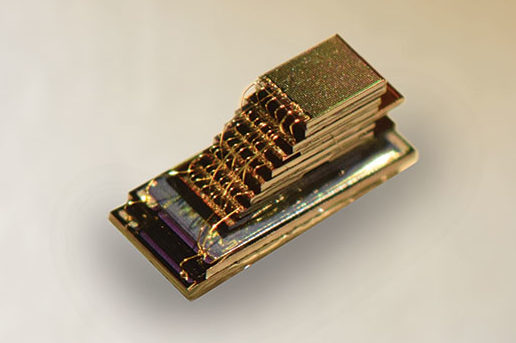Michigan’s millimeter-scale computers featured at ISSCC2017, and in IEEE Spectrum
Professors Blaauw and Sylvester showcase capabilities of tiny computing

 Enlarge
Enlarge
Profs. David Blaauw and Dennis Sylvester presented a total of 10 papers at the 2017 IEEE International Solid-State Circuits Conference (ISSCC). Most were related to their Michigan Micro Mote (M3) computers. Prof. Sylvester also presented a Short Course on Ultra-Low Power References and Oscillators (see the advance program for a list of all the papers presented).
In 2014, the Michigan team began sharing the M3 with researchers around the world, while continuing to advance the technology here at Michigan. Their goal is to make smarter, smaller sensors for medical devices and the Internet of Things—sensors that can do more with less energy. Part of the purpose of sharing the devices is for other researchers to expand on the applications possible with the M3 technology.
At the conference, Blaauw and Sylvester described micromote designs that use only a few nanowatts of power to perform tasks such as distinguishing the sound of a passing car and measuring temperature and light levels. They also described their work with Taiwan Semiconductor Manufacturing Company (TSMC).
IEEE Spectrum published a story about Michigan’s millimeter-scale computers represented at ISSCC 2017, and focused on one of the micro motes that incorporated a deep-learning processor. The device “can operate a neural network while using just 288 microwatts,” wrote Katherine Bourzac. A neural network will help the computer to gather only relevant information, an increasingly important feature in a world inundated with data.
Blaauw and Sylvester are co-founders (with Prof. Prabal Dutta, Dr. Yoonmyung Lee, and Prof. David Wentloff) of the company CubeWorks, which plans to manufacture the micromotes in a few years.
Read the full story: Millimeter-Scale Computers: Now With Deep-Learning Neural Networks on Board (by Katherine Bourzac, IEEE Spectrum, 2/10/17)
 MENU
MENU 
